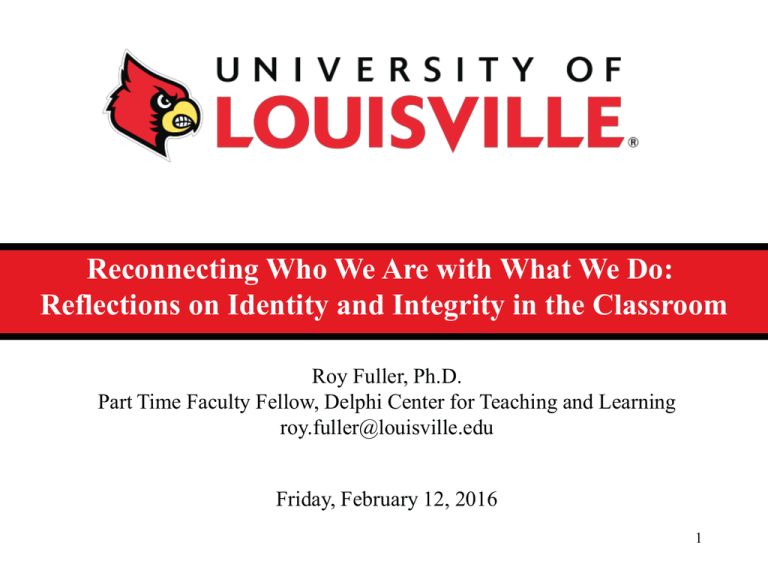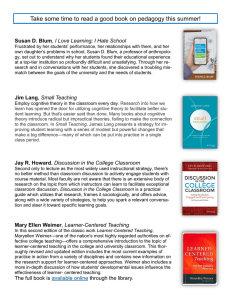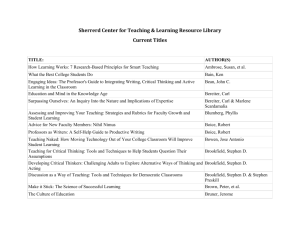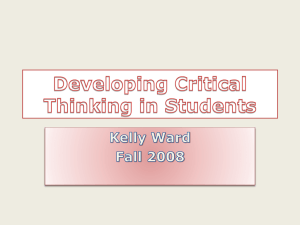Reconnecting Who We Are with What We Do:
advertisement

Reconnecting Who We Are with What We Do: Reflections on Identity and Integrity in the Classroom Roy Fuller, Ph.D. Part Time Faculty Fellow, Delphi Center for Teaching and Learning roy.fuller@louisville.edu Friday, February 12, 2016 1 Today’s Session Objectives - Go beyond classroom techniques and strategies to examine our identity as teachers - Offer opportunities for reflection on our identity as teachers - Question our assumptions about teaching and learning - Offer resources for personal renewal 2 Teaching is……. my job my profession my hobby my source of income my calling other? 3 The best teachers ask themselves what they hope students can do intellectually, physically, or emotionally by the end of the course and why those abilities are important. Ken Bain Responses? 4 Metaphorical Exercise: Global Answer the following: Take a minute. Teaching is to learning as is to . practice is to performance. weeding is to gardening. recipes are to cooking. coaching is to playing. conducting is to the orchestra. 5 Education is not the filling of a pail, but the lighting of a fire. William Butler Yeats 6 Metaphorical Exercise: Personal Fill in the blank: Quickly! When I am teaching at my best, I am like a 7 Self-Examination What can we do to examine ourselves? 8 Model for Reflection: Stephen Brookfield Four Critically Reflective Lenses – through which we can view our teaching 1) Our Autobiographies as Learners and Teachers 2) Our students’ Eyes 3) Our Colleagues’ Experiences 4) Theoretical Literature How might we engage in self-examination by using these lenses? Becoming a Critically Reflective Teacher by Stephen Brookfield, 1995, chapter two Table work: Taking Refuge Using the “Taking Refuge” handout - respond to the three prompts. 10 No pedagogical technique is always better than another. Maryellen Weimer 11 What is skillful teaching? Three core assumptions: 1) Skillful teaching is whatever helps students learn. 2) Skillful teachers adopt a critically reflective stance towards their practice. 3) The most important knowledge teachers need to do good work is a constant awareness of how students are experiencing their learning and perceiving teachers’ actions. (Stephen Brookfield, The Skillful Teacher, chapter 2) 12 “I tried it and it didn’t work!” - “No strategy, policy, activity or assignment “works” the same way for every student.” - No strategy, policy, activity or assignment “works” for every teacher. - No strategy, policy, activity or assignment “works” in every course. - Make predictions but don’t be surprised by the outcome. - No new approach is the best it can be the first time you try it. - The success of any strategy, policy, activity or assignment ought to be measured in how well it promotes learning.” “I Tried It and It Didn’t Work!” Maryellen Weimer, Faculty Focus, June 4, 2014. Accessed at: http://www.facultyfocus.com/articles/teaching-professor-blog/tried-didnt-work/ 13 Reflection: What I believe Respond to the three prompts on the “What do you believe” worksheet. 14 Inspiration Teachers, I believe, are the most responsible and important members of society because their professional efforts affect the fate of the earth. Helen Caldicott 15 Through the Eyes of Students If a student was asked to describe you as a teacher, what do you think they would say? What would you like this student to say? What will they say they learned in your class? 16 Themes/descriptors for best college professors (from students) 1) Communication 2) Helping 3) Teaches well 4) Uses different modalities 5) Fun 6) Builds relationships 7) Organized 8) Motivating 9) Makes learning interesting 10) Teaches for understanding 11) Involving 12) Caring 13) Challenges student 14) Knowledgeable 15) Respectful “A mixed analysis of college students’ best and poorest college professors.” Slate, et at.,in Issues in Educational Research, 19(1), 2009 17 Themes/descriptors for worst college professors (from students) 1) Uncommunicative 2) No learning 3) Poor teaching 4) Off-task 5) Unprepared 6) Poor time management 7) Disrespectful 8) Boring 9) Uncaring 10) Unprofessional behavior 11) Did not use multiple modalities 12) Talks, not teaches “A mixed analysis of college students’ best and poorest college professors.” Slate, et at.,in Issues in Educational Research, 19(1), 2009 21 The Challenge: Improving Our Teachers Some traits are related to instructional practices. Others are personal traits. Students don’t necessarily see the difference. These findings are significant because instructional practices are typically less difficult to change that are personal traits. “A mixed analysis of college students’ best and poorest college professors.” Slate, et at.,in Issues in Educational Research, 19(1), 2009, p. 76 22 Summary: Students yearn for good teachers “[Students] want us to share with them our love of our fields, they are hungry for intellectual passion, and they are most likely to become engaged in that passion under the guidance of people whom they care about and who, they believe, care about them.” B.H. Carson, Thirty Years of Stories, The professor’s place in student memories 20 Palmer’s thesis “Good teaching cannot be reduced to technique; good teaching comes from the identity and integrity of the teacher.” Parker Palmer, The Courage to Teach 21 “Passion for the subject propels the subject, not the teacher, into the center of the learning circle – and when a great thing is in their midst, students have direct access to the energy of learning and of life.” Parker Palmer, The Courage to Teach, p.122 22 Exercise: Best Learning and Teaching Moments Write a brief description of a moment in your teaching when things were going so well you knew you were born to teach. Write a brief description of a moment in your learning when everything just “clicked” and you got it. 23 Examining our Teaching Philosophy 1) Describe the best learning experience you had as a student. 2) Describe the best teaching experience you have had as an instructor. 3) What are you trying to achieve in your students with your teaching? 4) Why is this important to you? 5) How do you achieve your objectives you stated in # 3 above? 6) Why do you use these particular strategies as opposed to other that are available to you? “Six Questions That Will Bring Your Teaching Philosophy into Focus,” by Neil Haave, accessed at www.facultyfocus Teaching is not about charismatically charged individuals using the sheer force of their characters and personalities to wreak lifelong transformation in students’ lives. It’s about finding ways to promote the day-to-day, incremental gains that students make as they try to understand ideas, grasp concepts, assimilate knowledge, and develop new skills. All these small things you do to make this happen for students represent the real story of teaching. Helping learning is what makes you truly heroic. Stephen Brookfield 25 Resources The Courage to Teach, by Parker Palmer & his Center for Courage and Renewal http://www.couragerenewal.org/ What the Best College Teachers Do, by Ken Bain The Skillful Teacher, by Stephen Brookfield Learner-Centered Teaching, by Terry Doyle Learning and Motivation in the Postsecondary Classroom, by Marilla Svinicki http://www.facultyfocus.com/ 26


